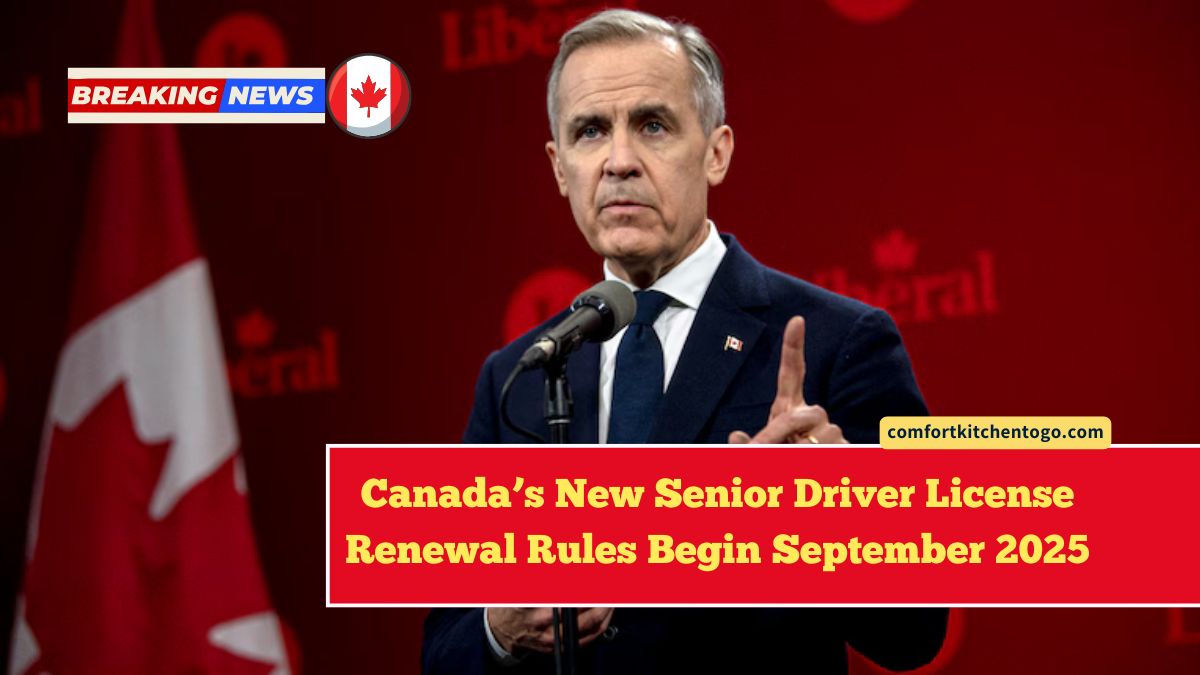Starting September 2025, Canada’s driving license renewal system for seniors will undergo major changes to improve road safety while respecting the independence of older drivers.
The Ministry of Transportation of Ontario (MTO) announced this policy shift as part of a national initiative to adapt to the country’s aging population.
Over 7 million Canadians are aged 65 or older, and many still rely on their vehicles for daily living. These new rules reflect a growing need to assess driving fitness based on health, not age alone.
What the New Rule Means for Elderly Drivers
The Driving License Renewal Age Rule 2025 mainly affects drivers aged 80 and above. While the renewal frequency of every two years remains for most, new criteria will now include:
- Mandatory medical assessments at each renewal
- Vision testing as before
- Enhanced group education sessions
- Updated written knowledge test
- Case-by-case on-road tests based on medical referrals
The goal is to create a personalized and safety-first system that ensures only medically fit seniors are on the road, without unfairly penalizing healthy drivers.
Senior License Renewal – Before & After
| Requirement | Before (Until Aug 2025) | After (From Sept 2025) |
|---|---|---|
| Renewal Interval | Every 2 years | Every 2 years (some cases annually) |
| Vision Test | Required | Required |
| Education Session | Standard format | Revised, more interactive |
| Written Test | Basic | Updated with live reviews |
| On-Road Evaluation | Rare | Required if referred by a doctor |
| Medical Assessment | Basic, limited | Mandatory, more comprehensive |
These upgrades will be digitally integrated, enabling seniors to schedule appointments, upload documentation, and access resources through the MTO’s secure portal.
Why These Changes Are Necessary
Seniors remain some of the safest and most cautious drivers. However, age-related impairments like slower reaction times, reduced vision, and cognitive decline can increase accident risks. The new system aims to:
- Ensure fit and healthy seniors can continue to drive
- Identify those at risk through proactive health checks
- Encourage early detection of driving-inhibiting conditions
The strategy also acknowledges that not all seniors age the same. Some remain sharp into their 90s, while others face challenges earlier. Hence, individual evaluation replaces broad age-based judgment.
What Seniors Should Do Now
If you’re approaching age 80 or already within that bracket, you should:
- Schedule annual check-ups with your doctor and optometrist
- Begin preparing for the updated written test with the new curriculum
- Track notifications from the MTO via mail or online accounts
- If flagged, consider booking a driving assessment with a certified instructor
Taking these steps early will ensure you don’t face disruptions to your driving privileges in September 2025.
The Driving License Renewal Changes for Seniors launching in September 2025 represent a critical step toward balancing public safety and personal independence.
With structured evaluations, updated testing, and digital support, Canada is building a fairer and safer renewal system for its growing senior population.
If you’re an elderly driver, staying informed, proactive, and medically updated will ensure you continue to enjoy the freedom of safe driving for years to come.
FAQs
What age group does the new rule affect?
The updated rules apply primarily to drivers aged 80 and older, with personalized assessments based on health.
Will every senior need to take an on-road test?
No. On-road evaluations will only be necessary if recommended by a physician or medical review panel.
Can parts of the renewal be completed online?
Yes, booking, notifications, and document submissions can be handled online, but medical and vision checks require in-person visits.

